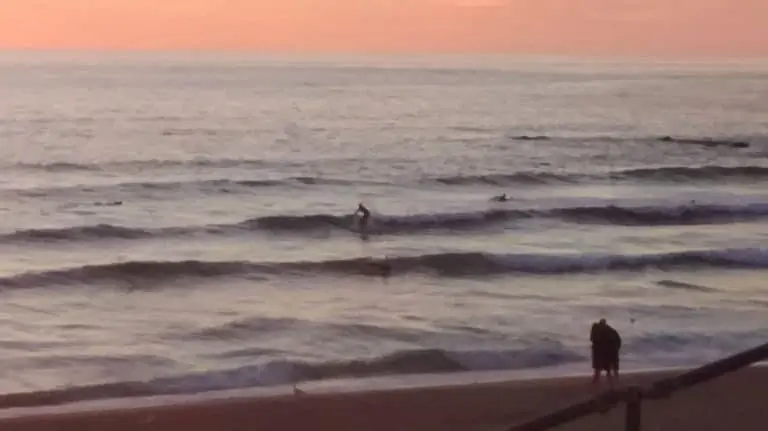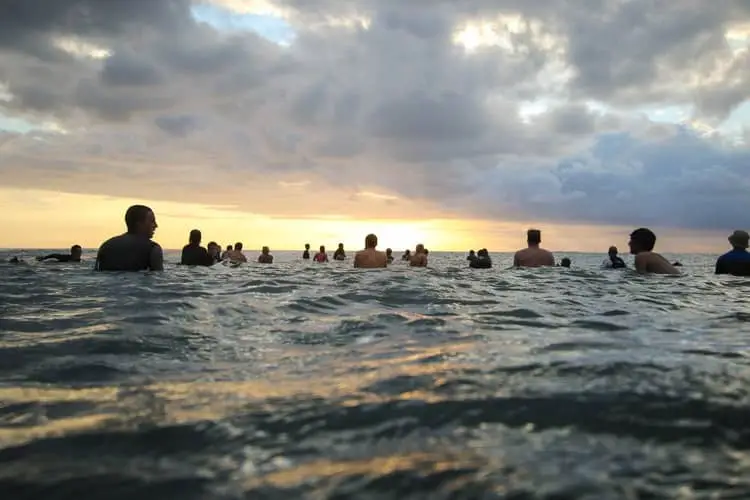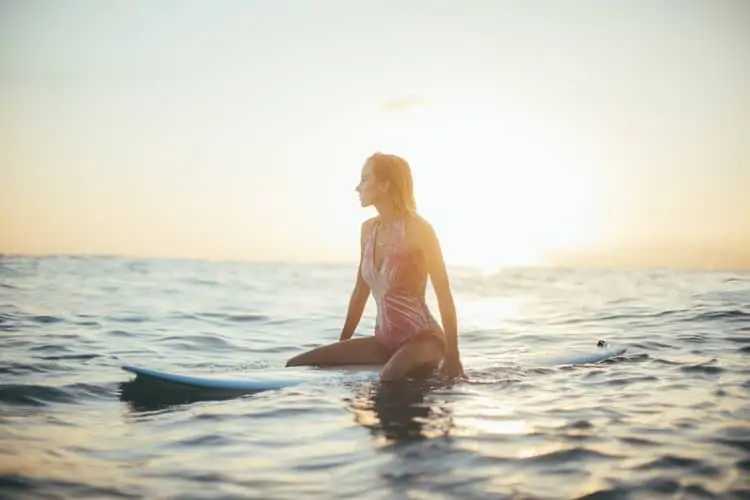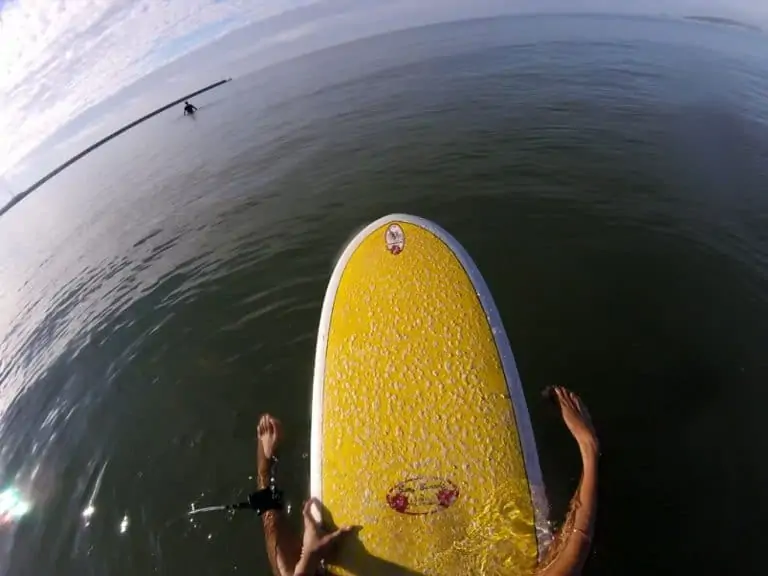How Fit Do You Need to Be to Learn to Surf?
With over 20 years of surf experience under my belt, I can certainly say that surfing will leave you in the best shape of your life!
Surfers are often famous for being in top shape and condition, with shots all over Instagram and beyond of male and female surfers in peak physical condition.
The only problem is, when you’re just learning to surf this it can feel slightly intimidating especially if you aren’t as fit as you’d like.
I remember how nervous I felt paddling out into the surf in the early days when I wasn’t in great shape, with things like paddling and popping up being particularly challening.
So, how fit do you need to be to learn to surf? A moderate level of fitness is enough but the fitter you are, the easier it will be for you to pop up on your board, so it’s worth getting fitter before you hit the waves. Try running or swimming to prepare for surfing, as I’ll explain below.
With that in mind, here’s everything you need to know about getting in shape for surfing including which are the best surf exercises for beginners, what you need to focus on and whether you need to be a strong swimmer.
How do I get in shape for surfing?
Surfing itself gives you a great whole-body workout that will keep your heart rate up, build those muscles, continually challenge your balance and get you fit.
With that said, you’ll find it much easier to get the most from your surf training and get your body to do what you want it to if you’re already in decent shape.
The surfing workout below from the Surf Strength Coach will help you build your endurance, strength and balance to get you ready for those waves.
Endurance
You’ll need to have a decent level of physical endurance if you want to learn to surf as you’re likely to be there moving continuously for at least an hour at a time.
Most of this you’ll develop as you keep improving your surfing skills, challenge yourself with those new moves and spend time out there on the water.
Still, you’ll really see the benefits if you take time between surf sessions to work directly on your endurance. Find an activity that gets your heart rate up and that you enjoy then make it part of your week. Running, swimming, cycling and skating are all great choices.
Strength
You’ll be using your arms and shoulder muscles a lot when you paddle out to those waves as wells your core to keep you stabilised and balanced, your butt to help you control your movement over the waves and numerous other muscles too.
So, if you want to crush those advanced moves (and even those less advanced ones!), you’ll need to know your muscles won’t let you down. That’s why it’s a good idea to build your surf strength too.
With just one or two strength training sessions per week (that incorporate plenty of upper body exercises for ‘surf paddling’), you can build the functional muscles you need for surfing fast. You don’t need to spend all day inside a dark sweaty gym either- just fire up YouTube and you’ll find a ton of useful workout videos that can help give you the strength workout you need.
Do functional moves like squats, lunges, pushups, pullups and rows, using just your bodyweight when you get started. Make sure you target your entire body, including your core, arms and legs as they all count. As you become stronger, it’s a good idea to add resistance or weights to keep you challenged.
Balance
There’s a good reason why surfers love to practice yoga. It’s because it can help you stay flexible and avoid injury whilst also helping to improve your skill on the board. If you’re not keen on the idea of yoga, why not give a sport like slacklining a try instead? It’s a lot of fun and it could really help your surf skills.
General
In addition to these, you should aim to stay as active as you possibly can. Walking is a great low impact exercise you can incorporate into your day that will boost your fitness without leaving you aching all over!
Many other surfers also love skateboarding, skating, snowboarding and skiing that demand similar skills to help keep them in shape.
If you are looking to learn to surf but can’t get to the beach often, or even for more than a few times a year, then check out my article on learning to surf without water below:
Is it hard to learn to surf?
Despite its reputation as being a tricky sport, it’s actually quite easy to pick up the skills you need to stand up on a surfboard and it needn’t take more than a couple of hours.
Having said that, you do need to be willing to put in the effort.
Like most other sports, you need to accept that you’ll keep falling and picking yourself up time and time again, especially when you’re first working through those surfing exercises for beginners.
How long it takes you to learn to surf depends on factors like how old you are, how good your balance is, how fit you are and how you deal with frustration, and more.
Yes, you’ll probably feel frustrated when you almost manage to stand and wipe out yet again, but it will be worth it.
Once you can stand on your board, you’re officially a surfer and can get ready to tackle the trickier stuff.
Just remember to take it one wave at a time and always have fun – don’t be in such a rush to get better that miss out on enjoying the small victories along the way!

How good of a swimmer do you need to be to surf?
Anyone who wants to surf should be able to swim, for obvious reasons. You don’t want to be out of your depth in the sea, lose your board and be unable to keep yourself safe.
It’s better if you can swim at least 200m and feel confident in the water if you want to progress to a more advanced level. Having said that, beginners do stick to shallow water during low tide during the earlier stages so you don’t need to be an excellent surfer at this stage.
You can also see more on this in the dedicated article I wrote on the topic here:
Summary
To quickly wrap things up, you don’t need to be incredibly fit before you start learning to surf although it does help if you are relatively active, can swim a few lengths and you can enjoy your session without feeling too exhausted.
Make sure you do also take time to improve on your surf fitness by doing sports and activities you love, adding a few strength sessions to your weekly routine and having plenty of fun!
Related Questions
Does surfing give you a good body? Surfing is one of the best ways to get fit. It gives you a whole-body workout, builds strong yet slim muscles and gives you a healthy tan. You’ll also be having fun so will look even more attractive.
Can I teach myself to surf? Yes, you can teach yourself to surf if you’re already fit, a strong swimmer, persistent and willing to learn the rules and etiquette involved with learning how to surf.
As I’ve mentioned elsewhere, I’d always recommend having a surf lesson to start your surf journey and then go off and learn on your own with friends. However, if it’s not an option for you, you can still learn on your own but just remember it that it might get you there faster if you do take that first surf lesson.
You can see more tips on how to find a good surf school or good surf lesson in the video I made on this topic below:







